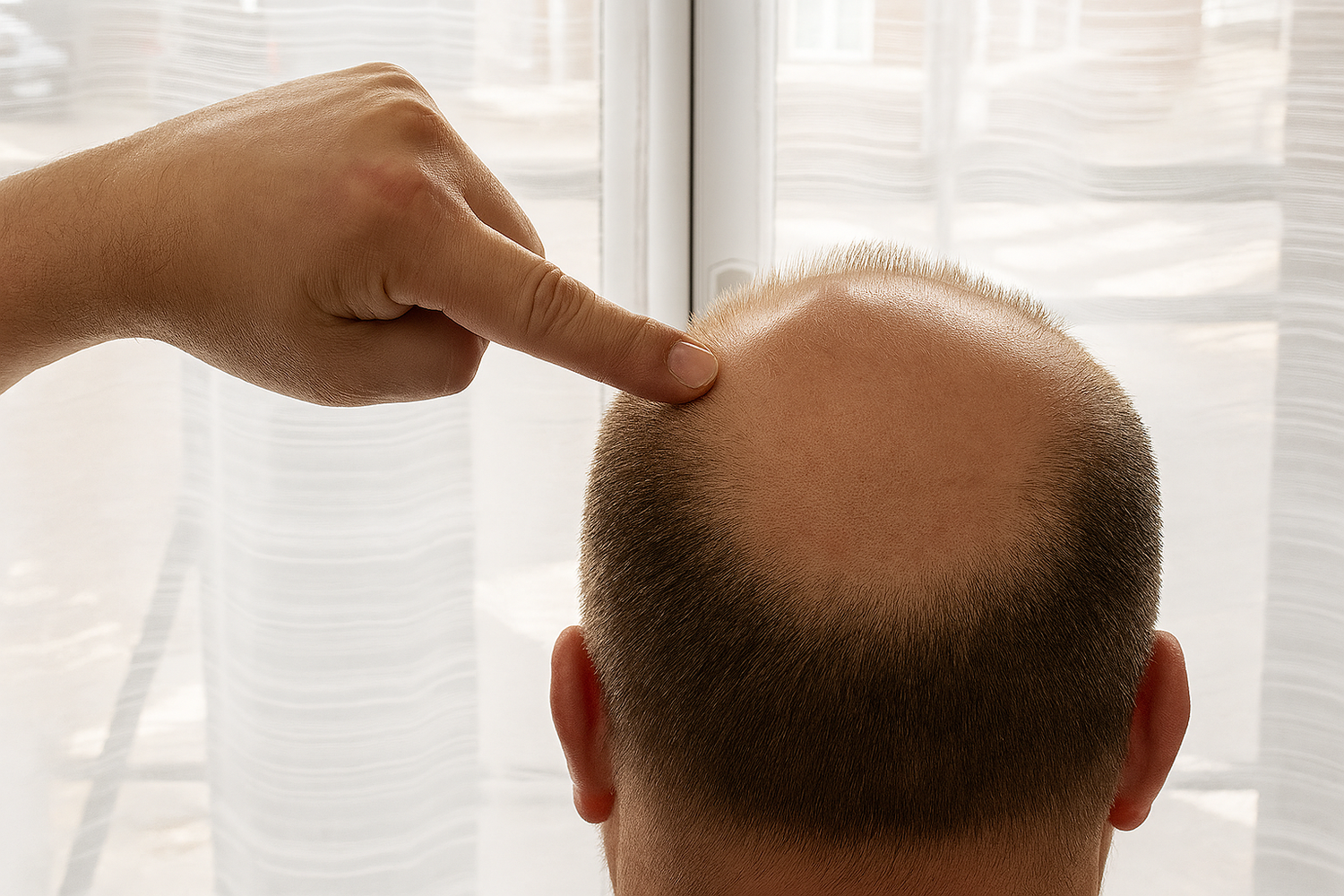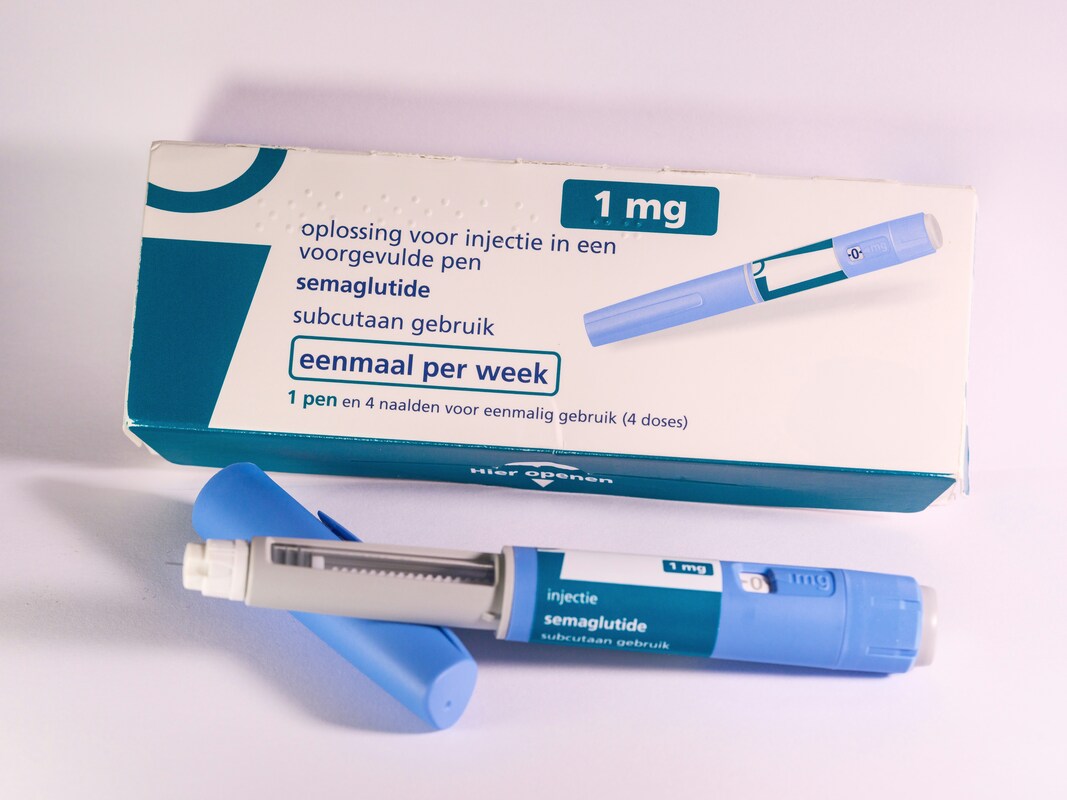If you’re a guy taking Wegovy or thinking about it, you’ve probably run into the big scary question: Does Wegovy cause hair loss in men?
Short answer: a small uptick shows up in trials, and many men who report shedding link it to fast weight loss and nutrition shifts rather than the drug alone. Most shedding cases improve over time, especially when weight and diet stabilize.
Below, you’ll see what the data says, what men in forums describe, and simple steps to sort out the cause with your doctor.
What Research and Trials Say
In Wegovy clinical trials, about 3% of users reported hair loss compared to about 1% on placebo. That signal shows up in FDA summaries compiled by Drugs.com. So the risk looks higher than placebo, but still low overall.
A 2025 preprint on medRxiv found a higher ratio for hair loss among semaglutide users compared with some other drugs. That points to a possible link, yet it doesn’t prove direct causation. More peer‑reviewed research will help sort out how much of the shedding comes from the medicine itself versus weight loss, nutrition changes, or stress.
Bottom line from current evidence:
-
Hair loss appears in a small share of users in trials.
-
Many cases line up with telogen effluvium, a temporary shedding state that often follows fast weight changes or illness.
-
Data is still growing, so expect clearer answers as new studies are published.
Now, scientists still need more controlled studies. Until then, the safest takeaway is that Wegovy may play a part for some men, but weight loss and nutrition appear to play a much bigger part for many.
Four Reasons Why Hair Can Shed on Wegovy
Hair thinning on semaglutide isn’t always about the medication. Men can shed for several reasons.
Here are the four most common causes linked to reports.
Rapid Weight Loss
Rapid weight changes can stress the body. When that happens, more follicles shift from growth to a resting phase. Shedding often shows up 2 to 4 months later. Strands come out more easily in the shower or when brushing. Hair often looks thinner overall rather than in patches. As weight and intake stabilize, growth generally returns over the next few months.
Nutrient Gaps from Appetite Suppression
Semaglutide can lower appetite. Some men eat far less protein and fewer micronutrients without noticing. Hair needs steady building blocks. Shortfalls that can raise shedding risk:
-
Protein: low intake can stall growth and weaken strands.
-
Iron and ferritin: low levels link to diffuse shedding.
-
Zinc: supports follicle health and growth cycles.
-
Vitamin D: low status shows up often in shedding workups.
-
Biotin: true deficiency is rare, yet severe gaps can affect hair.
Men who keep protein intake steady and cover key nutrients tend to report fewer issues in forums.
Medication‑Specific Effect
GLP‑1 medicines, including semaglutide (Wegovy, Ozempic) and tirzepatide (Mounjaro), have emerging signals tied to hair loss reports. The mechanism is not nailed down. Current data does not prove a direct follicle effect in most users, but the association in trials and the preprint suggest a role in a subset of people.
Other Causes
Sometimes shedding happens for reasons that have nothing to do with Wegovy.
Possible triggers include:
-
Stress, poor sleep, and major life events
-
Thyroid imbalance
-
Hereditary pattern thinning becoming more visible after fat loss
-
New supplements or meds
-
Skin conditions on the scalp
-
Getting new medications
Because hair growth is slow, the trigger might be something that happened months ago. That’s also why timeline tracking helps so much.
What Men Are Reporting Online
Forums and patient groups are full of men trading stories about hair shedding while using Wegovy or Ozempic. Anecdotal evidence is mixed, yet it offers helpful patterns.
Common threads include:
-
Shedding shows up 2 to 4 months after starting semaglutide or after a fast drop on the scale.
-
Diffuse thinning is more common than patchy loss.
-
Many men say shedding slows once weight stabilizes and protein intake improves.
-
Some see clear regrowth by month 6 to 9.
-
A smaller group reports longer recovery or continued thinning.
Reddit threads and patient groups include comments from men who lose a larger volume of hair.

Others on steady, slower weight loss say they notice little change.

There are also guys who say they didn’t shed at all, which reinforces that the response varies from person to person.

Since these are self‑reports, they help with pattern spotting, not final answers. Still, the timing and the diffuse nature line up with telogen effluvium in many posts.
How to Tell if it’s Wegovy or Something Else
If you’re trying to solve the mystery, start with your symptoms. A short checklist can point you in the right direction:
-
Timeline: Shedding started how long after your first dose or dose change? Telogen effluvium often shows up 2 to 4 months after a trigger.
-
Rate of weight loss: Faster drops raise stress on follicles. Slower loss tends to be gentler on hair.
-
Diet pattern: Are you hitting daily protein goals? Any big cuts in iron‑rich foods?
-
GI symptoms: Ongoing nausea, vomiting, or diarrhea can lead to nutrient loss.
-
New meds or supplements: Some can trigger shedding on their own.
-
Family history: Pattern thinning can speed up during life changes and feel sudden.
-
Scalp symptoms: Itching, pain, flaking, or redness point to scalp issues that need treatment.
-
Blood work to discuss: CBC, ferritin, TSH, vitamin D, zinc, and a basic metabolic panel. Many clinicians add B12 and folate. These help rule out common, fixable causes.
Steps to Slow Shedding and Support Regrowth
You don’t have to sit back and hope for the best. There are simple steps that can help steady your hair and make the whole process less stressful.
You can support your hair and get clear answers with a simple plan:
-
Track What’s Happening
Note start date, dose changes, weekly weight, and the week shedding began. Take monthly photos in the same lighting. This helps you and your clinician see real trends.
-
Steady the Nutritional Base
Aim for protein at each meal. Many men target 0.7 to 1.0 grams per pound of goal body weight, confirmed with a clinician.
Add iron‑rich foods if ferritin is low. Pair with vitamin C foods to help absorption. Cover zinc and vitamin D. Sunlight helps vitamin D, yet labs guide dosing best.
Avoid crash dieting. Slower loss often means less shedding.
-
Get Labs and Review Them
Ask your prescriber about CBC, ferritin, TSH, vitamin D, zinc, B12, and folate. Correcting a low ferritin or vitamin D level can make a clear difference for many.
-
Talk to Your Prescriber Before Changing Your Dose
Share your timeline and photos. Discuss dose spacing or a short pause if shedding is severe. Never stop a prescription without medical advice.
-
Use Low‑Risk Topical Support
Minoxidil can help speed regrowth in telogen effluvium and can support existing strands in men with pattern thinning.
Scalp‑care add‑ons: caffeine tonics, rosemary oil, peppermint oil, gentle shampoos that keep the scalp clean without irritation. These support scalp health while the trigger is addressed.
-
Bring in a Dermatologist if Shedding is Heavy or Lasts Beyond 6 Months
A scalp exam and, in rare cases, a biopsy can separate telogen effluvium from other causes. Treatment can be adjusted based on findings.
Wegovy vs Ozempic vs Mounjaro
When people search for a GLP-1 hair loss comparison, they’re usually trying to figure out whether one medication causes more shedding than the others.
Wegovy and Ozempic both contain semaglutide, so semaglutide hair loss concerns are basically the same across both drugs. You’ll see a lot of “Wegovy vs Ozempic side effects” threads online. But when it comes to hair loss, the risk is the same because they use the same ingredient.
Mounjaro, powered by tirzepatide, sometimes gets extra attention thanks to viral Mounjaro hair loss stories, but the pattern is the same: ultra-fast weight loss can push hair into a resting phase. If weight loss is gradual and nutrition stays solid, most people don’t notice increased shedding at all.
Red Flags: When You Need a Doctor
While hair shedding from weight loss usually isn’t dangerous, certain signs need fast medical help:
-
Sudden patchy bald spots or broken‑off hairs
-
Scalp pain, burning, thick crusting, or pus
-
Severe shedding with fever, chest pain, dizziness, or rapid unintended weight loss
-
Signs of thyroid crisis or anemia, like fainting, shortness of breath, or palpitations
These deserve prompt checks, because they don’t match the usual Wegovy pattern.
Bottom Line: What Men Should Know
Men on Wegovy can see a small increase in hair loss reports compared with placebo in trials. A new preprint points to a higher risk signal compared with some other drugs. Many cases look like telogen effluvium tied to fast weight loss or nutrient gaps, and those cases are often temporary. A steady diet, lab checks, and a talk with your prescriber go a long way. If shedding is severe or patchy, get a dermatology visit.
If you want non‑prescription scalp support while you work through the steps above, look for evidence‑based topicals. Caffeine, rosemary oil, peppermint oil, ginseng, and licorice root are common picks in scalp care. These support a healthy environment for regrowth while you and your clinician address triggers like fast weight loss or low ferritin.
Try Spartan’s Full Hair Growth System, which includes several products: Root Activator Shampoo, Root Activator Conditioner, and Root Activator Spray for hair loss. Together, these products clear your scalp, stimulate hair follicles, and help you grow healthy hair.
FAQs
Are men more likely than women to lose hair on Wegovy?
Data by sex is limited. Reports come from both men and women. The stronger factor seems to be the rate of weight loss and nutrition.
Does Wegovy affect beard hair?
Beard hair sits in different growth cycles. Most reports focus on scalp hair. Beard thinning is far less common in forums.
What other drugs can cause hair loss in men?
Common ones include isotretinoin, some antidepressants, beta blockers, blood thinners, and high‑dose vitamin A. Thyroid meds can play a role if dosing is off.
Is Ozempic any different from Wegovy for hair loss?
Both contain semaglutide. Ozempic is labeled for diabetes. Reports of shedding appear in both groups, with similar timing patterns.
Can supplements fix the problem?
Supplements help when a deficiency exists. Labs help guide iron, vitamin D, zinc, B12, and folate. Extra biotin rarely helps if levels are normal.



